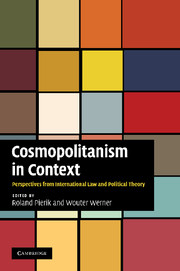Book contents
- Frontmatter
- Contents
- 1 Cosmopolitanism in context: an introduction
- Part I Environmental protection
- Part II World Trade Organization
- Part III Collective security and intervention
- Part IV International Criminal Court
- 8 Rawls's Law of Peoples and the International Criminal Court
- 9 An ideal becoming real? The International Criminal Court and the limits of the cosmopolitan vision of justice
- Part V International migration
- Part VI Conclusion
- Index
- References
9 - An ideal becoming real? The International Criminal Court and the limits of the cosmopolitan vision of justice
Published online by Cambridge University Press: 06 December 2010
- Frontmatter
- Contents
- 1 Cosmopolitanism in context: an introduction
- Part I Environmental protection
- Part II World Trade Organization
- Part III Collective security and intervention
- Part IV International Criminal Court
- 8 Rawls's Law of Peoples and the International Criminal Court
- 9 An ideal becoming real? The International Criminal Court and the limits of the cosmopolitan vision of justice
- Part V International migration
- Part VI Conclusion
- Index
- References
Summary
Introduction
Although still in its infancy, the International Criminal Court (ICC) has already become a powerful symbol of a long-hoped for international legal order in which universal human rights and cosmopolitan ideals of justice can win protection from the imperatives and intrusions of statecraft. The ICC is a standing institution with wide international backing, far-reaching jurisdiction, and a mandate to prosecute the perpetrators of the world's worst atrocities – those “that deeply shock the conscience of humanity.” As such, the ICC stands as a bulwark against the dehumanization of modern warfare and genocidal violence, and as an agent of individual and societal rehumanization.
The ICC represents an unprecedented opportunity to dispense justice globally – and not only to particular victims, particular countries, or at particular moments in time. In this regard, the ICC represents an improvement over international courts constrained by much more limited territorial and temporal mandates, such as the United Nations International Criminal Tribunals for the Former Yugoslavia (ICTY) and Rwanda (ICTR). Even as advocates hail the jurisprudential precedents set by these two UN tribunals – and other more recently created tribunals such as the Special Court for Sierra Leone – there has been unease about an ad hoc political process in which international justice is provided only for some parts of the world. This selectivity can be viewed as discriminatory insofar as it privileges the suffering and targets the wrongdoing only of individuals from certain states.
- Type
- Chapter
- Information
- Cosmopolitanism in ContextPerspectives from International Law and Political Theory, pp. 195 - 218Publisher: Cambridge University PressPrint publication year: 2010
References
- 1
- Cited by



